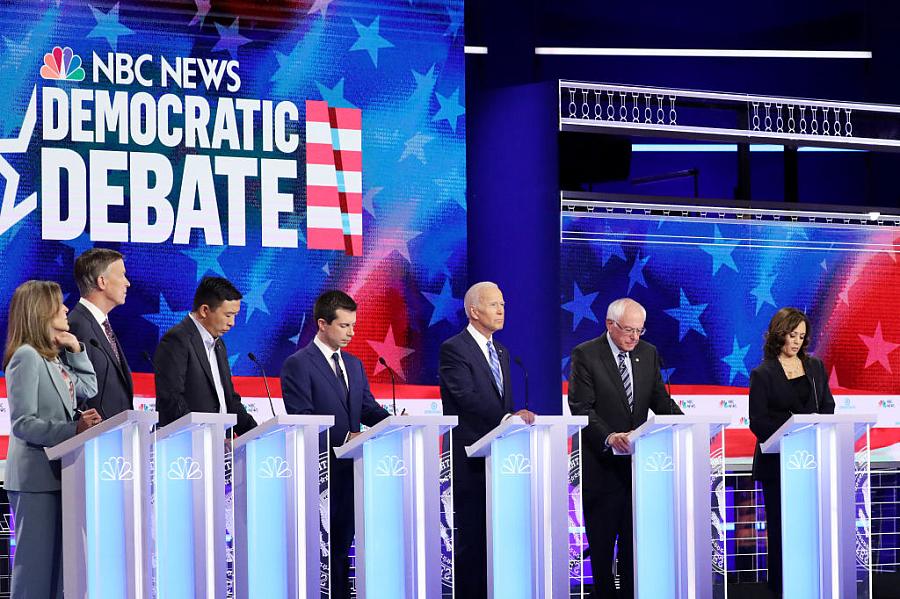The next big health reform debate is all about costs, not expanding coverage

(Photo by Drew Angerer/Getty Images)
What does the public really want when it comes to health care?
In 2017, I thought the country had turned a corner. Perhaps Americans were ready to embrace deep changes in their health insurance arrangements when angry people flooded Congressional town halls that spring, demanding that people with preexisting conditions have the right to buy health insurance. And when Congress later that year narrowly refused to repeal the Affordable Care Act, which extended coverage to millions more over the past decade, health care as a basic right seemed poised to become a universal value.
The national conversation now appears to be shifting again. The raucous Democratic primary debates and ads from big money groups suggest the country is still stuck at the same intersection where special interests and the public interest collide.
The big questions remains: Does the public believe everyone should have guaranteed health care for life — and are we willing to pay for it?
The Democratic primary debates taken as a whole didn’t answer the question. Instead, they melted into a discussion of the specifics of legislation rather than a continued focus on the larger question. We got the candidates’ takes on whether private insurance would become obsolete under a “Medicare for All” plan — an unpalatable solution for some of the candidates. We heard about a public option dusted off the shelf from the Obamacare wars. That was also popular with some candidates. We also learned that some Americans like their health insurance from private carriers like Aetna, Cigna, and UnitedHealthcare, an observation that has become a common talking point in the current discussion.
Setting aside Medicare for All, these are the details of bill crafting and compromise and probably flew over the heads of many listeners. They don’t directly address the larger question of whether every American should have a guaranteed right to coverage.
TV ads from special interest groups are beginning to address that larger question and subtly or not, they are undermining the notion of health insurance for everyone.
In a $4 million ad campaign, a dark money interest group with ties to Republicans is doing just that by attacking single-payer plans and implying Americans aren’t keen on giving up their private health insurance. The ad disparages the national health systems of other countries and raises the specter of “socialized medicine.”
The ads show people with signs indicating wait times in countries with national health systems: 10 weeks for heart surgery, 26 weeks for brain surgery, 11 weeks for an MRI. That’s scary stuff, but with no source or attribution for these claims, viewers are misled. “Medicare for All would eliminate private insurance for 180 million people — you and every American waiting in the same government-run plan,” the ad goes on. The ad implies a brutal tradeoff: If everyone gets coverage, you might not get care or have to wait a long time for it.
“The actual debate won’t be about access. It will be about cost containment for all people.” —Dr. Robert Blendon, Harvard
What does the public want right now as we approach the third round of health reform in the past 25 years? I rang up Dr. Robert Blendon, senior associate dean at the T.H. Chan School of Public Health at Harvard and a veteran health care pollster. “People are unsure about what the alternatives would do for them,” he told me. “It’s status quo bias.” Their current arrangements may not be ideal, he explained, but they are leery of changing to something new when their insurance is mostly working.
That said, Blendon told me, health care will loom large in the general election, but the focus won’t be coverage this time. “The actual debate won’t be about access. It will be about cost containment for all people,” he said, adding that big plans to expand coverage like Medicare for All, or a Medicare buy-in plan, or a public option, won’t be the theme of the 2020 election.
A new “Perspective” piece in the New England Journal of Medicine by Blendon and colleagues noted that about three-quarters of the public thinks that Americans are paying too much for most of their care relative to its quality, and a majority believes that health insurance premiums are increasing mostly to boost the profits of insurers or accommodate high prices for care.
Blendon said the public’s view on controlling health care costs is at odds with that of policy makers. The experts say we have to contain costs, he explained, but the average American wants to spend more money on things like mental health and long-term care. As he and his colleagues recently wrote, “Americans are not particularly concerned about aggregate health spending either overall or on the part of the government.” They see the issue of health costs as mostly a price problem for them, not one of overutilization, a favorite theme of the wonk community.
If Blendon is right, the cost of hospital services and the price of prescription drugs will loom larger in the public’s mind in the coming election than plans to expand coverage, whether that be a public option, Medicare buy-in or some other health insurance system that covers everyone.
It may be that covering all Americans will be a dream deferred yet again.
Veteran health care journalist Trudy Lieberman is a contributing editor at the Center for Health Journalism Digital and a regular contributor to the Remaking Health Care blog.

